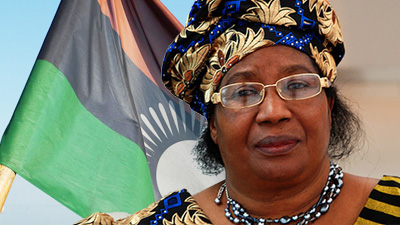LILONGWE, Malawi – Last October the president of Malawi, Joyce Banda, told European Union delegates in Brussels that she was ready to sacrifice her political career for economic reforms in the country. Banda was mainly referring to a 40 percent currency devaluation that her administration implemented a few weeks after its ascendency to power on 7th April last year. This followed the sudden death of her predecessor, Bingu wa Mutharika, who succumbed to a heart attack two days earlier.
Banda’s Brussels statement sounded very patriotic, statesman-like and reminiscent of a great leader – she may yet be any of these. But in this context, the statement underlined a conundrum that has, thus far, been the defining feature of President Banda’s leadership.
The Malawian economy is almost entirely dependent on grants and donations. Banda has admitted that without outside help the country is in dire straights. Having inherited an economy on the verge of collapse, after being deserted by donors due to Mutharika’s poor diplomatic relations, perceived arrogance and deteriorated human rights record, Banda is only too aware of the importance of continuing to keep them sweet.
The situation has given donors bargaining power, which has forced Banda to accept their advice, including IMF austerity measures willy-nilly. Banda recently told a Guardian documentary that “if our friends and international partners do not come, if they packed they packed up today and left, we are dead.”
The donor prescribed economic measures have not always been popular locally; this is a problem for Banda because she cannot afford to alienate the donors or the people that give her a mandate to govern. She has already witnessed Mutharika’s fall from grace after failing to negotiate such a conundrum. Mutharika saw donors walking out on him and died a hated figure at home, to the extent that a section of Malawians celebrated his death – something unheard of in the country’s traditions.
The problem of having to please two parties whose demands are not always mutual is that eventually something will have to give – hence her “I am ready to sacrifice my political career” assertion. Yet Banda is not sacrificing herself just yet and is fighting hard for her political career. In doing so, she has had to master the art of political doublespeak and would never make a statement like the above whilst in Malawi – where all her speeches are crafted to fit in with her ambition of winning 2014 elections. I previously made a case that the Joyce Banda the world sees may not be the one Malawians know.
Upon her ascendancy to power she made sure she reversed all the Mutharika era policies that were frown upon by donors – something Malawians were generally happy to accept. She has done it with some considerable success and is enjoying a lot of good will from the international community. The currency devaluation that her predecessor staunchly refused to do has been her most visible concession to the donors, especially the IMF. This is also crucial insofar as her ambition to attract badly needed investors in Malawi is concerned.
Some economic challenges have somewhat eased, especially fuel and foreign currency shortages – though increasingly expensive and unaffordable for many people due to high inflation rates. But a big majority of Malawians agreed on the necessity of the currency devaluation; it was well overdue and it was inevitable if the economy was to get back on track.
The contentious issue, however, has been its implementation – particularly the lack of proper measures to cushion poor and vulnerable people from its effects. Another related issue is the pegging of the Kwacha to the US Dollar, which in the last seven months has seen inflation rising from 20.1 per cent to 21.7. This makes it the highest inflation rate in SADC (Southern Africa Development of Community). This is also the lowest the Kwacha has been since 1993, when the country was undergoing transition from one party state to multiparty democracy.
Last month, the consumer rights group (Cama) organised a national protest against the rising cost of living. They delivered a petition giving the government an ultimatum of 21 days to address the issues raised or face more protests. The Civil service trade union has also warned that its members will stage a sit in protest on 11th and 12th February. They are unhappy about the working conditions of civil servants, poor salaries and the government’s apparent lack of interest in addressing these problems.
Currently there is also worrying drug shortage in hospitals which, according to the ministry responsible, means hospitals are lacking 95 percent of the supplies they need. A few weeks ago 15 concerned doctors from Kamuzu Central Hospital, a referral hospital in the capital Lilongwe, signed an open letter to president Banda asking for her intervention. The doctors said that the situation had forced them use their personal money to buy basic medical necessities for patients.
Some civil society groups have questioned why the government intervened swiftly to supplement the farm input subsidy programme (fisp) when it fell short earlier this year but is yet to stage a similar intervention in the health service. The government has since promised a procurement of drugs – the first since 2009.
The answer may be that politically Fisp is a crucial programme. The Majority of beneficiaries are from the rural population who form the majority of the voting block. Approximately 86 percent of Malawians live in rural areas. Mutharika’s landslide in 2009 elections is largely attributed to the subsidies programme.
Joyce Banda’s decisiveness on fisp and demonstrably lax approach in other areas of the economy is an indication of her seriousness about the 2014 elections. She is uncertain about her chances, because of the struggling economy, but also because she has never before contested an election as President and the political party she formed two years ago, after she was expelled from Mutharika’s then party, will be facing its first elections.










